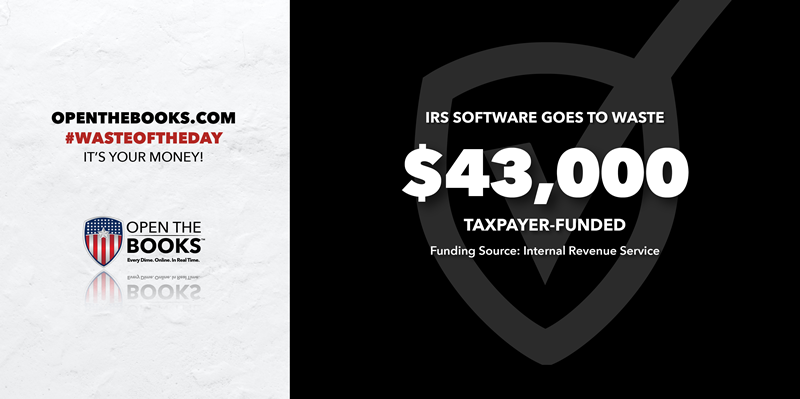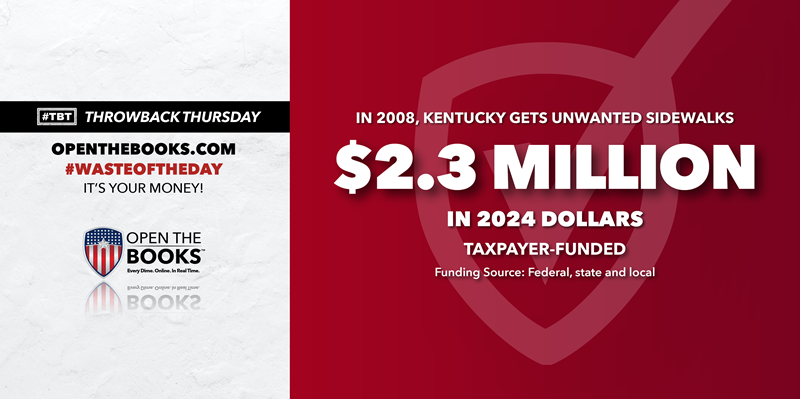
New Houston Mayor Declares His City “Broke”
June 3, 2024

Topline: A Delaware employee stole $181,000 from the state’s Department of Labor early last year, but the public didn’t find out until this April. The truth was only revealed after the WHYY News public radio station contacted the Delaware Department of Labor following a tip.
Key facts: Unemployment insurance administrator Michael Brittingham allegedly stole the money from the Delaware Unemployment Compensation Fund, according to WHYY.
The State of Delaware hired Brittingham in February 2019. That summer, he was sentenced to two years in prison for stealing almost $43,000 from his homeowner’s association by writing checks to a company he owned, NEWAGE Management LLC, the news outlet reported.
Instead of being fired by the state, Brittingham had his jail time turned into probation and even earned multiple job promotions while still serving his sentence. The state Department of Labor bizarrely blamed it on the fact that employees are expected to “self-report” criminal convictions in a statement to WHYY News.
Brittingham’s salary doubled from $35,000 to $70,000 in that time span, according to records at OpenTheBooks.com.
Brittingham then allegedly pulled the same check-writing scheme on a much larger scale. In January 2023, he instructed his staff to issue two tax refunds to NEWAGE Management LLC: one for $86,827 and another for $94,357
He was caught by his colleagues once they realized the business’s address matched the one listed on Brittingham’s 2019 arrest warrant.
Brittingham took his own life in April 2023 shortly after an investigation was opened.
Background: The theft is just one part of larger issues with Delaware’s Department of Labor. Its $390 million unemployment fund was deemed to be “unauditable” in a state report issued this year.
Independent auditors took the “unprecedented” step of issuing a “disclaimer of opinion” on the unemployment insurance fund, meaning its accounting practices are so poor that they could not determine whether its financial statements are accurate.
But the auditors’ report did not mention the theft. Even now, the state refuses to tell WHYY News whether the investigation has been closed.
Critical quote: “I’m not sure how or why they tried to keep it quiet other than they don’t want to bring attention to the fact that everything is really screwed up,” Laura Henderson, a tax collection manager at the state’s Unemployment Insurance Office, told WHYY News.
“We would love for there to be transparency. For us to just put it out in the open like, ‘Hey, we’re drowning and let’s come up with a plan here.’”
IRS Bought, But Didn’t Use, Software To Improve Customer Service
June 4, 2024

Topline: The IRS has never been the most popular government agency, but a new audit report says their customer service is so poor it could lead to tax returns being filed incorrectly or not at all.
Key facts: The IRS runs 363 in-person Taxpayer Assistance Centers to help people fill out their taxes or get legal advice.
But the process for changing or cancelling an appointment at one of the centers creates a “burden” for taxpayers because many IRS customer service agents don’t have access to the software that lets them view or change in-person appointments.
There’s a baffling reason for that: the agency pays for 2,500 software licenses each year so agents can edit appointments, but auditors found 768 licenses not even being used.
Each license costs $56 annually, so that’s $43,000 spent last year on the unused licenses.
When customers call the IRS to edit or cancel an appointment, they are instructed to hang up and call a different “Appointment Telephone Line” number.
Agents were not allowed to transfer calls directly to the Appointment Telephone Line, though managers could not explain to auditors why this policy is in place. It was changed last December.
Even some agents working the Appointment Telephone Line don’t have access to the correct software. They’re forced to transfer calls to yet another IRS agent who can finally provide assistance. There were 144,005 transferred calls in fiscal year 2023, according to the audit report.
Last year 75,000 people did not show up to scheduled in-person appointments at Taxpayer Assistance Centers, which auditors said is likely because they got frustrated with customer service and gave up on canceling their appointment.
Critical quote: Auditors wrote that, “The lack of a streamlined appointment process can result in extended wait times … which can potentially delay taxpayer return filings and reduce the public’s trust in the IRS’s efficiency.”
Background: The IRS “Taxpayer Bill of Rights” says everyone is entitled to “prompt, courteous, and professional assistance” with their taxes.
But the IRS disconnected 6.1 million phone calls in fiscal year 2022 and 1.5 million calls in fiscal year 2023 because they didn’t have enough agents manning customer service lines, according to the audit report.
Meanwhile, the IRS paid six-figure salaries to 11,486 employees last year, according to OpenTheBooks.com. What are all those staffers doing if not assisting taxpayers?
Summary: The $43,000 the IRS spent on its unused software licenses is just a tiny fraction of the agency’s total budget, but it’s representative of much larger issues with tax simplicity and transparency.
Northwestern University Gives In To Protestors, Accepts Middle East Money
June 5, 2024

Topline: Northwestern University — one of the only colleges to negotiate with and appease pro-Palestinian protesters this spring — has received $4.14 billion in U.S. taxpayer money since 2018, according to a new report from OpenTheBooks.com.
Northwestern has also accepted nearly $1 billion since 2007 from foreign donors, including $690 million from the Middle Eastern nation of Qatar.
Key facts: While some colleges punished or even arrested anti-Semitic, anti-Israel student protesters, Northwestern gave into student demands.
Administrators agreed to leave an “aid tent” for protesters to use until June, created five scholarships for Palestinian undergraduate students and hired two Palestinian faculty. They also plan to make an advisory committee that will consider sanctions on Israel.
Northwestern has become a top target of Congressional calls to defund universities who allow antisemitism on their campuses.
Since 2018, the school has received $2.6 billion in grants from the U.S. Department of Health and Human Services, $361 million from the National Science Foundation, $256 million from the Department of Defense, and much more.
Northwestern, like other colleges, gets a tremendous tax benefit: taxed for just 1.4% of its $14.9 billion endowment, not 23.5% like wealthy individuals.
The school’s money from Qatar was partly to fund scholarships for Middle Eastern students. Northwestern was also paid to open a campus in Qatar’s “Education City” along with Georgetown, Carnegie-Mellon and more.
Northwestern also received $24 million from Saudi Arabia.
Background: University President Michael Schill testified on May 23 along with other university presidents at a U.S. House of Representatives hearing on campus antisemitism.
Northwestern and Rutgers received the most scrutiny from lawmakers for tolerating antisemitism, according to the Associated Press.
Supporting quote: Schill defended his decision to end the pro-Palestinian encampment through negotiations.
“We had to get the encampment down,” Schill told Congress. “The police solution was not going to be available to us to keep people safe, and also may not be the wisest solution as we’ve seen at other campuses across the country … I would never recommend to the Board of Trustees divestment of anything or any academic boycott of Israel.”
Critical quote: “You should be ashamed of your decisions that allowed antisemitic encampments to endanger Jewish students,” Rep. Virginia Foxx (R-NC) told Schill. “You should be doubly ashamed for capitulating to the antisemitic rule breakers.”
Summary: Just as taxpayers deserve to know how the government spends their money, those paying tuition deserve to know which foreign nations are funding their universities.
Throwback Thursday: Kentucky Spends on Sidewalks That Residents Don’t Want
June 6, 2024

Throwback Thursday!
Topline: Most residents of Lexington, Kentucky never wanted a sidewalk on Tates Creek Road. They said foot traffic was “non-existent.”
But after 12 years of trying, Lexington finally installed the sidewalks at a cost of $1.7 million in 2013, forcing down wasteful spending like bad medicine. The money combined local, state and federal funding and would be worth $2.3 million today.
Most of the ordeal is documented in the “Wastebook” reporting published by the late U.S. Senator Dr. Tom Coburn. For years, these reports shined a white-hot spotlight on federal frauds and taxpayer abuses.
Coburn, the legendary U.S. Senator from Oklahoma, earned the nickname "Dr. No" by stopping thousands of pork-barrel projects using the Senate rules. Projects that he couldn't stop, Coburn included in his oversight reports.
Coburn's Wastebook 2008 included 65 examples of outrageous spending worth more than $1.3 billion, including the federal cash squandered on Lexington’s unwanted sidewalks.
Key facts: The Lexington government first tried to build sidewalks on Tates Creek Road in 2001, but the idea fell through after a lack of community support.
Lexington asked the federal government for help, which gave the city a grant in 2008 to combine with local money and raise $1 million for the project.
Backlash was almost immediate. One resident told the Lexington Herald-Leader, “I do not see any need for this and neither do any of my neighbors” because the sidewalks would “desecrate” the natural beauty of the road’s maple and pine trees.
Another said that "I don't see foot traffic or anybody trying to create foot traffic there for any purpose."
The project was soon delayed, but not because of its unpopularity. The Lexington government’s original cost estimate had ignored the need to buy land from private property owners in order to make the sidewalks wide enough.
Lexington appealed to yet another source: the State of Kentucky. Then-Governor Steve Beshear sent over $556,000 in 2013, which Lexington supplemented to complete the project at a total cost of $1.7 million.
The 5-foot-wide sidewalks stretched for 1.6 miles.
Lexington's Commissioner of Planning Derek Paulsen said the sidewalks were necessary for safety. When asked why residents couldn’t walk on the grass, he explained that was not possible for wheelchair users.
The saga appeared to be finished until this April, when officials announced plans to build sidewalks on two adjacent streets.
Summary: If the main beneficiaries of a federal grant need to be convinced that the project is not a waste of money, the cash could likely be put to better use.
San Francisco Is Treating Alcoholism with Free Beer
June 7, 2024

Topline: San Francisco spends $5 million each year on its “Managed Alcohol Program,” which provides free beer and vodka to homeless addicts, according to the San Francisco Chronicle.
Key facts: The small program started in 2020 to help those in isolation suffering from alcohol withdrawal. Now it operates 20 beds in a former hotel, where nurses provide limited amounts of alcohol so homeless residents can fuel their addiction without risking alcohol poisoning.
It made headlines this May after Adam Nathan, chair of the Salvation Army San Francisco Metro Advisory Board, posted on X about watching homeless drunks line up for free beer. Nathan said people “can just walk in and grab a beer,” but the city health department told the San Francisco Chronicle that the program is more controlled than that.
Supporters say the program saves money by keeping homeless alcoholics off the streets and decreasing their reliance on emergency services. The goal is to keep people out of the hospital but not necessarily to get them sober.
The San Francisco Chronicle reports that the program is part of the city’s larger use of “harm reduction.” Other programs give drug addicts clean needles and overdose-reversal drugs instead of promoting abstinence.
Even Mayor London Breed recently came out against harm reduction.
The program has some beds “earmarked to serve the Latinx/Indigenous Mayan community.” The city’s public health system says “Latinx individuals experience worse alcohol related health complications and mortality, face greater criminalization, and have limited access to treatment.”
Program participants are also allowed to use marijuana, according to Fox News, although it’s not provided by the city.
Critical quote: “As a Democrat, I’m all for directing more government funds to programs that achieve their objectives and provide public benefits … But this isn’t working,” Nathan said on X. “The whole system is incentivized to make money off those people rather than help them get healthy … We are living in the upside down.”
Summary: Alcohol can get expensive, but most privately-owned bars probably wish they had as much cash on hand as San Francisco’s free alcohol program.
The #WasteOfTheDay is presented by the forensic auditors at OpenTheBooks.com.